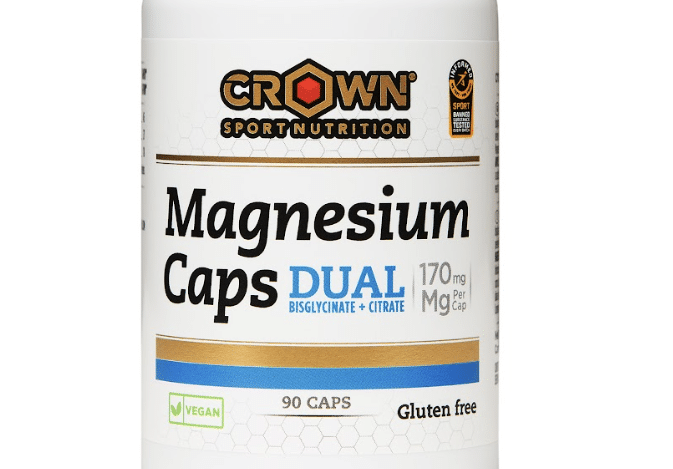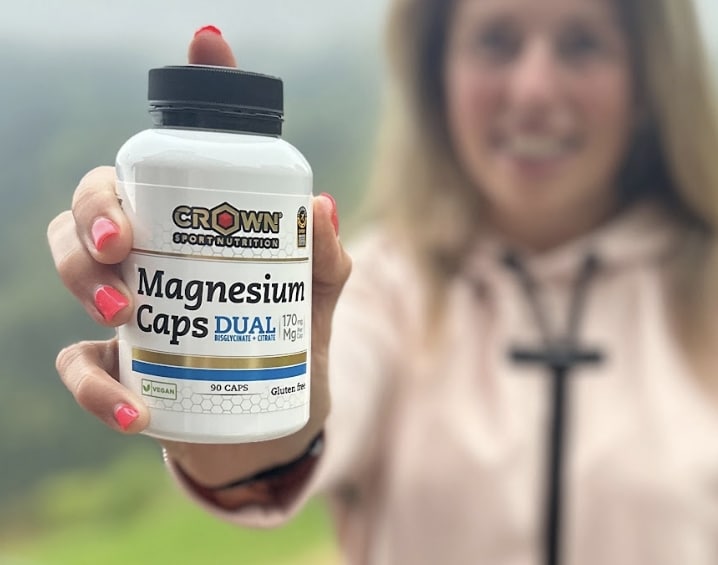Magnesium, what is it and why is it important?

In sports nutrition, in addition to focusing on calories and macronutrients, it is crucial not to neglect micronutrients, with magnesium being a key mineral that is often underestimated.
The importance of magnesium for health
Although minerals such as iron or calcium have a greater role and have been widely studied both in the field of health and performance, magnesium has traditionally enjoyed less prominence.
However, this mineral is also of great importance, being necessary for the correct functioning of cardiovascular, immune and hormonal responses.1
For this reason, the main international institutions recommend that at least 400 – 420 mg be consumed per day for men and 310 – 320 mg for women, with requirements being higher in some cases such as breastfeeding.
Although a balanced diet is often sufficient to meet the requirements of most micronutrients, including magnesium, there is surprising data regarding magnesium deficiency in the population.
For example, a study carried out in different European countries observed that in practically all of them the average consumption was lower than recommended (with an average consumption of 260 - 270 mg/day in countries such as France or Italy).2
We found similar data in another study carried out in the United States population, which concluded that about half of the population would have a deficient magnesium intake.3
Therefore, controlling magnesium intake to make changes to the diet or include supplementation may be advisable in certain cases.
Magnesium and sport
Like other conditions that increase energy demands (e.g., breastfeeding), physical exercise also increases magnesium demands.
For example, a study carried out on almost 200 British Olympic athletes over 8 years observed that at least 22% had been deficient in magnesium at some point.4
These data may be of great relevance, since in addition to having important functions in health, magnesium also influences numerous processes related to sports performance.
For example, magnesium is necessary for the proper functioning of muscle contraction and relaxation, as well as for the processes of anabolism to occur (that is, muscle creation and regeneration).
In fact, magnesium levels have been linked to testosterone, a major anabolic hormone, as well as strength and muscle mass levels.5
And although magnesium is especially important in people with deficiencies of this micronutrient, such as older people, it has also been shown to be important in athletes. For example, a study in basketball, volleyball and handball players – who, by the way, were again generally deficient in magnesium – observed a correlation between the levels of this micronutrient and muscle strength and jumping values.6
This does not necessarily mean that more magnesium is always better, but probably having low values of this mineral is negative for performance.
Confirming these results, another study in women showed that reduced magnesium levels were associated with greater oxygen consumption and higher heart rate at submaximal loads; That is, an a priori “light” exercise was harder for them.7
Therefore, it is advisable to avoid magnesium deficiency in any population, including athletes. For this the magnesium supplementation could be beneficial, at least in those cases in which the diet is not sufficient to meet basic requirements.
And, if we look at the studies that have supplemented with magnesium in athletes who already had an optimal state of this mineral, no consistent benefits are found in sports performance, as shown by a meta-analysis that included 14 studies.8
However, in physically demanding situations we are more likely to have deficiencies in different micronutrients, including magnesium, and therefore we are more likely to find benefits from supplementation.
For example, a study carried out in a situation as physically demanding as the Vuelta a España showed that those cyclists who supplemented with magnesium (400 mg per day during the 3 weeks of competition) compared to those who did not supplement, showed that the group Those who were not supplemented had a greater drop in magnesium levels during the competition, indicating that the supplementation was effective in preventing the decrease in this mineral.9
Additionally, the non-supplemented group had higher blood levels of myoglobin, a marker of muscle damage.9
Conclusions
Magnesium has important functions for both health and performance, and therefore adequate intake of this mineral is essential.
In the general population, a consumption of at least 400 – 420 mg per day for men and 310 – 320 mg for women is recommended.
However, in situations of high physical load (such as those that athletes sometimes face) these requirements could increase. This micronutrient is generally obtained through the diet, but as we have seen, even so, a large part of the population, especially athletes, ingest deficient values of this mineral.
Therefore, in some cases magnesium supplementation can be beneficial to avoid a deficiency of this mineral.
NEW MAGNESIUM CAPS DUAL FROM CROWN SPORT NUTRITION

Crown Sport Nutrition launches the second of its products in the health line for athletes, the Magnesium Caps DUAL:
- Capsules with 170 mg of highly assimilable magnesium
- From 2 sources: Bisglycinate and Citrate
- With anti-doping certificate by Informed Sport
- Organic salts for greater absorption and bioavailability
- Only 3 ingredients: no additives or excipients
- Free of allergens and suitable for vegans
- Bottle format 90 capsules at €19,95
Author
Pedro Valenzuela from FISSAC.com
References
-
Musso CG. Magnesium metabolism in health and disease. Int Urol Nephrol. 2009;41(2):357-362. doi:10.1007/s11255-009-9548-7
-
Mertens E, Kuijsten A, Dofková M, et al. Geographic and socioeconomic diversity of food and nutrient intakes: a comparison of four European countries. Eur J Nutr. 2019;58(4):1475-1493. doi:10.1007/s00394-018-1673-6
-
Rosanoff A, Weaver CM, Rude RK. Suboptimal magnesium status in the United States: Are the health consequences underestimated? Nutr Rev. 2012;70(3):153-164. doi:10.1111/j.1753-4887.2011.00465.x
-
Pollock N, Chakraverty R, Taylor I, Killer SC. An 8-year Analysis of Magnesium Status in Elite International Track & Field Athletes. J Am Coll Nutr. 2020;39(5):443-449. doi:10.1080/07315724.2019.1691953
-
Valenzuela PL, Morales JS, Emanuele E, Pareja-Galeano H, Lucia A. Supplements with purported effects on muscle mass and strength. Eur J Nutr. 2019;58(8). doi:10.1007/s00394-018-1882-z
-
Santos DA, Matias CN, Monteiro CP, et al. Magnesium intake is associated with strength performance in elite basketball, handball and volleyball players. Magnes Res. 2011;24(4):215-219. doi:10.1684/mrh.2011.0290
-
Lukaski HC, Nielsen FH. Dietary magnesium depletion affects metabolic responses during submaximal exercise in postmenopausal women. Hum Nutr Metab. 2002;132(January):930-935.
-
Wang R, Chen C, Liu W, et al. The effect of magnesium supplementation on muscle fitness: A meta-analysis and systematic review. Magnes Res. 2017;30(4):120-132. doi:10.1684/mrh.2018.0430
-
Córdova A, Mielgo-Ayuso J, Fernandez-Lázaro D, Roche E, Caballero-García A. Impact of magnesium supplementation on muscle damage of professional cyclists competing in a stage race. Nutrients. 2019;11(8):1-12. doi:10.3390/nu11081927
There are no previous results.




























